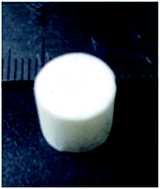Our official English website, www.x-mol.net, welcomes your
feedback! (Note: you will need to create a separate account there.)
Wide range temperature-dependent deformation and fracture mechanisms for 8701 under dynamic and static loading
RSC Advances ( IF 3.9 ) Pub Date : 2018-04-18 00:00:00 , DOI: 10.1039/c8ra01169a Hong-Fu Guo 1 , Yan-Qing Wu 1 , Feng-Lei Huang 1
RSC Advances ( IF 3.9 ) Pub Date : 2018-04-18 00:00:00 , DOI: 10.1039/c8ra01169a Hong-Fu Guo 1 , Yan-Qing Wu 1 , Feng-Lei Huang 1
Affiliation

|
Although the RDX-based composite explosive 8701 explosive 8701 has been widely used to achieve military goals, its mechanical properties have not been carefully investigated. In the present study, we focused on the mechanical response of 8701 at a wide range temperature from −125 °C to 100 °C under both quasi-static (about 0.001 s−1) and high-rate compression loading (about 600 s−1). The stress–strain curves exhibit different tendencies at different temperatures for both quasi-static and high strain-rate loading. The failure stress and elastic/storage modulus present important temperature-dependence. Differential scanning calorimetry (DSC) tests showed that the glass transition temperature and softening temperature of 8701 are 11.61 °C and 15.14 °C respectively, which is lower than that of the binder (with glass transition temperature of 25 °C and softening temperature 38 °C). For the quasi-static loading, scanning electron microscopy (SEM) observations revealed that 8701 shows an interface debonding failure mode along the binder phase below 15 °C, while the mechanical behavior of 8701 is dominated by softening behavior of the binder above 38 °C. For high-rate loading, 8701 shows a mixture of interface debonding and trans-granular cleavage when below 15.14 °C.
中文翻译:

8701 在动态和静态载荷下的宽范围温度相关变形和断裂机制
虽然RDX基复合炸药8701炸药8701已被广泛用于实现军事目标,但其力学性能并未得到仔细研究。在本研究中,我们专注于在准静态(约 0.001 s -1)和高速压缩载荷(约 600 s - 1)。对于准静态和高应变率载荷,应力-应变曲线在不同温度下表现出不同的趋势。失效应力和弹性/储能模量呈现出重要的温度依赖性。差示扫描量热法(DSC)测试表明,8701的玻璃化转变温度和软化温度分别为11.61°C和15.14°C,低于粘合剂(玻璃化转变温度为25°C,软化温度为38°) C)。对于准静态加载,扫描电子显微镜 (SEM) 观察表明,8701 在低于 15 °C 时显示出沿粘合剂相的界面脱粘失效模式,而 8701 的机械行为主要受 38 °C 以上粘合剂的软化行为支配. 对于高速率负载,
更新日期:2018-04-18
中文翻译:

8701 在动态和静态载荷下的宽范围温度相关变形和断裂机制
虽然RDX基复合炸药8701炸药8701已被广泛用于实现军事目标,但其力学性能并未得到仔细研究。在本研究中,我们专注于在准静态(约 0.001 s -1)和高速压缩载荷(约 600 s - 1)。对于准静态和高应变率载荷,应力-应变曲线在不同温度下表现出不同的趋势。失效应力和弹性/储能模量呈现出重要的温度依赖性。差示扫描量热法(DSC)测试表明,8701的玻璃化转变温度和软化温度分别为11.61°C和15.14°C,低于粘合剂(玻璃化转变温度为25°C,软化温度为38°) C)。对于准静态加载,扫描电子显微镜 (SEM) 观察表明,8701 在低于 15 °C 时显示出沿粘合剂相的界面脱粘失效模式,而 8701 的机械行为主要受 38 °C 以上粘合剂的软化行为支配. 对于高速率负载,











































 京公网安备 11010802027423号
京公网安备 11010802027423号